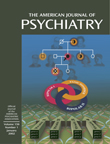Abuse and ACTH Response to Corticotropin-Releasing Factor
To the Editor: The article by Christine Heim, Ph.D., et al. (1) contains a misinterpretation concerning an article by my colleagues and me (2) that I would like to address. The article by Dr. Heim et al. showed that abused women without major depressive disorder exhibited greater than usual ACTH responses to corticotropin-releasing factor (CRF) administration, whereas abused women with major depressive disorder and depressed women without early life stress showed blunted ACTH response to ovine CRF administration (1). In our study, we showed that sexually abused girls recruited from a longitudinal prospective study demonstrated blunted ACTH response to ovine CRF. The article by Dr. Heim et al. incorrectly stated that “PTSD [posttraumatic stress disorder] was not systemically evaluated and the abused girls were not subgrouped according to the presence or absence of psychiatric disorders” (2, p. 579). In our article (2, p. 250), we stated that the subjects were evaluated with the Diagnostic Interview Schedule for Children and Adolescents (Washington University, St. Louis) to obtain DSM-III-R psychiatric diagnoses. The Diagnostic Interview Schedule for Children and Adults includes an evaluation for PTSD. In our Results section (p. 251), we also stated that there were “no significant effects of the presence of histories of dysthymia or of suicide attempt(s)” on plasma ACTH response to ovine CRF in the abused group.
Thus, our findings regarding sexually abused girls were similar to those of Dr. Heim et al. regarding depressed women who had histories of adverse life events. Correction of this misinterpretation may influence the discussion of their findings.
1. Heim C, Newport DJ, Bonsall R, Miller AH, Nemeroff CB: Altered pituitary-adrenal axis responses to provocative challenge tests in adult survivors of childhood abuse. Am J Psychiatry 2001: 158:575-581Google Scholar
2. De Bellis MD, Chrousos GP, Dorn LD, Burke L, Helmers K, Kling MA, Trickett PK, Putnam FW: Hypothalamic-pituitary-adrenal axis dysregulation in sexually abused girls. J Clin Endocrinol Metab 1994; 78:249-255Medline, Google Scholar



